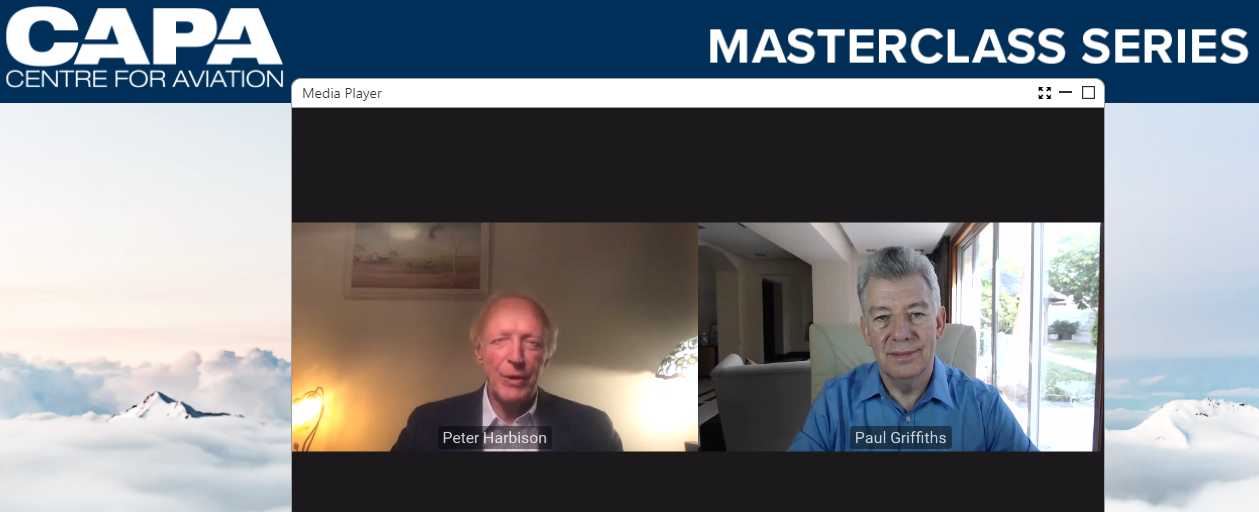The major global hub has been hit particularly hard by the dilution of global air travel due to the introduction of travel restrictions imposed to limit the spread of the coronavirus. With an almost non-existent domestic market in the United Arab Emirates (UAE) and with projections suggesting a laboured return of international air travel it has had to look very closely at its business activities.
Speaking during the latest in the CAPA - Centre for Aviation Masterclass series Mr Griffiths acknowledged that 2020 had actually started out positively, describing its 1Q performance as "pretty good" and "reasonably well". But, things changed dramatically in the third week of Mar-2020 when daily flight levels crashed from 1,100 a day to just 17.
This "sudden and very dramatic" decline in traffic followed as the UAE took "decisive action" and closed the airport to all except cargo flights," said Mr Griffiths. "The impact was very, very quick and very, very clinical," he added.
CHART - Dubai International Airport saw a decline in demand and capacity as the UAE took 'decisive action' to stop the spread of Covid-19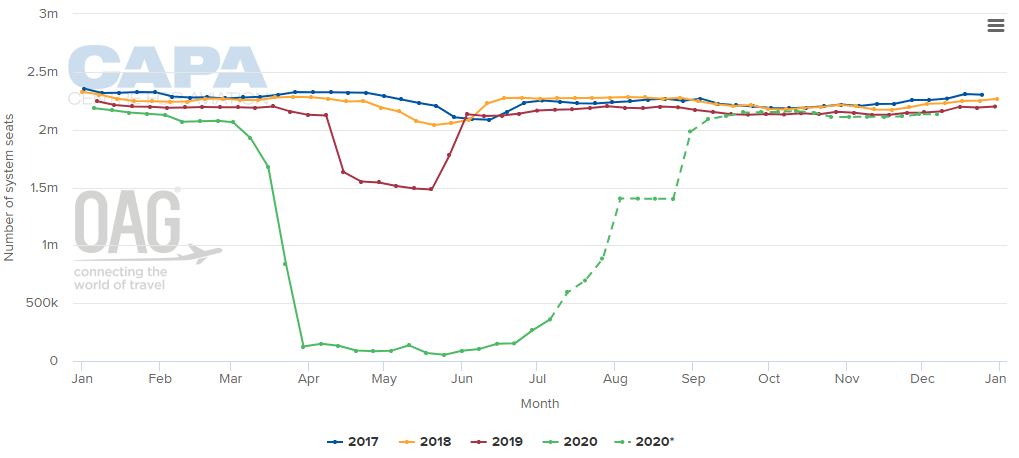 Source: CAPA - Centre for Aviation and OAG (data: w/c 29-Jun-2020)
Source: CAPA - Centre for Aviation and OAG (data: w/c 29-Jun-2020)
The impact is clear when you consider its traffic figures for May-2020. "In May-2020 we have recovered the same amount of traffic in the entire month that we would normally see in just four hours," explained Mr Griffiths.
Those figures are on up as the airport's largest tenant, Emirates Airline starts to resume operations following the lifting of passenger flight restrictions, but the outlook is unclear. "This situation is completely unprecedented and it has several strands to it that make it a particularly difficult thing to predict," warned Mr Griffiths.
Dubai Airports moved quickly to reduce its operating expenditure, a process that was eased by it using a lot of outsourced labour. Major savings were also made possible by hibernation of one of Dubai International's three terminals and closing three out of the four concourses on the southern side of the airfield.
"We are saving significant amounts of operating expense at the moment," said Mr Griffiths. Positively, if the airport can sustain that position through to the end of the year with a projected rise in traffic during the second half, it "may end up in a cash positive situation," highlighted Mr Griffiths. "Under the circumstances that would be quite an achievement," he acknowledged.
But that journey over the next six months is one filled with hurdles. As a hub airport Dubai International's recovery is not just about what is happening in the United Arab Emirates, nor just the Middle East, but the world and right now there is a balancing act between safeguarding peoples health and the economy.
This is a complex situation and Mr Griffiths said "there are three forces all working in opposition to each other" - medical progression and the continued spread of Covid-19; economic imperative (a factor that he believes will only get worse) and social impact.
"As we go on these things will increase in amplitude and increase in the difficulty of finding a way through them," he said, and Governments in most countries are "in a completely powerless position to really make the best decision out of a set of conflicting analyses".
Mr Griffiths believes that media and especially social media has had a big part to play in how the pandemic has played out. Unlike previous public health issues such as SARS and MERS, he outlined that Covid-19 has the added component of social media and that influenced reaction and meant a lot of time was lost in the early stages of the pandemic.
The pressure from both the press and social media "sacrificed authenticity for immediacy" and created such a noise that the actual advice and guidance from the WHO and health authorities just couldn't be heard, he said. This left governments and public "completely confused as to how much of a threat this particular situation became". If you look at the statistics, he noted there is a good correlation of Covid-19 spread with countries that "took quick action" against the virus and "those who denied it for too long".
CHART - The UAE is starting to see markets reopen with Pakistan, India and Bahrain currently seeing the largest offering from Dubai International Airport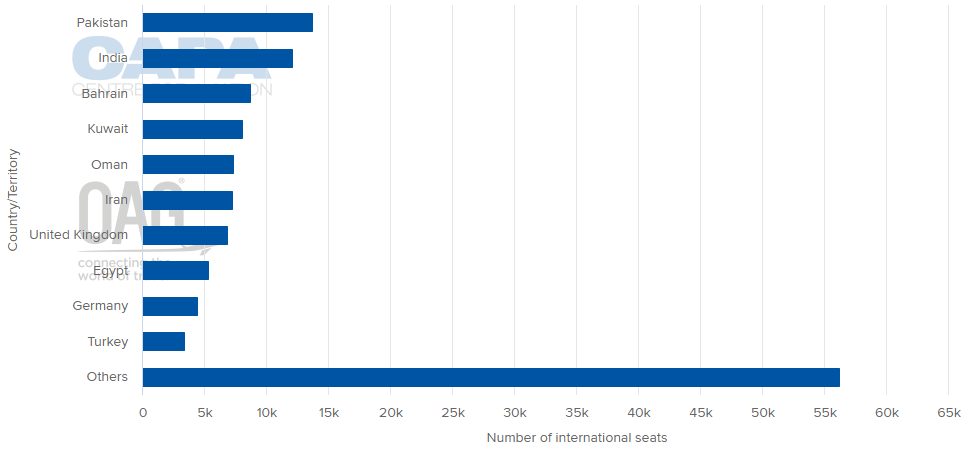 Source: CAPA - Centre for Aviation and OAG (data: w/c 29-Jun-2020)
Source: CAPA - Centre for Aviation and OAG (data: w/c 29-Jun-2020)
The outlook remains blurred, but Mr Griffiths is optimistic that there will be a pent up demand for travel. "We are adventurous by nature," he said and with half of the world's population facing some period of lockdown, he believes there is a lot of people that are desperate to get back travelling.
"I think the thing people are most missing is liberty and the freedom to go as they please," he said. "Not being able to travel - particularly in today's modern world - is a confiscation of birth rights."
However, the economic damage from lockdowns are obvious and there may be a need for the industry to move to a more value-based proposition with premium-driven demand being impacted by technology, he noted.
"Premium travel is under a huge amount of pressure," explained Mr Griffiths. "I think the whole first, business and economy airline set up will not be easy to sell as previously… premium economy and economy may be the key future areas."
CHART - Dubai International Airport currently sees an above average level of premium seats and could face some pressure as air travel resumes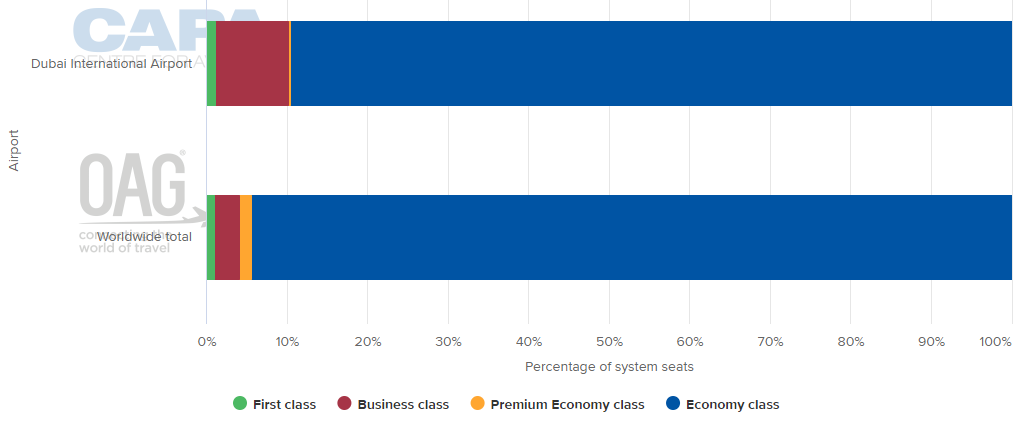 Source: CAPA - Centre for Aviation and OAG (data: w/c 29-Jun-2020)
Source: CAPA - Centre for Aviation and OAG (data: w/c 29-Jun-2020)
A key part of the return to travel is going to be ensuring that it is a safe experience for users. "It is public sentiment that is going to drive recovery," said Mr Griffiths. "We are not going to go out there and force people to get on aeroplanes. They will only get back on aeroplanes if they believe it is medically safe to do so." To achieve this we "have to get public sentiment re-established that it is safe to travel," he added and that he noted has "got to be based on the medical evidence and nothing else".
In the case of the Dubai market, where the traffic split is roughly 50/50 between point-to-point and transit demand even though Emirates Airline sees more than two thirds of its own passengers connecting through Dubai, Mr Griffiths said stimulating local demand and promoting the metropolis as a destination is a key aspect for the recovery as point-to-point demand is expected to recover quicker than transfer traffic.
But agreeing bilateral or multilateral corridors for travel based on medical evidence is not an easy task. "Getting a common standard on a global scale is a massive challenge," said Mr Griffiths. "I don't think it has ever been done as quickly as it needs to be done now."
Like all airport operators across the world Dubai Airports is adopting a range of new hygiene and sanitation processes to ensure the cleanliness of its facilities adopting physical distancing methods and employing biometric technology for touchless solutions to reassure passengers over their travel journey.
As a hub airport it faces the added challenge that flights generally tend to arrive and depart in flows so it is currently capping capacity at its Terminal 2 at 400 passengers per hour, less than a quarter of its normal 1,700 passenger throughput.
CHART - As a hub airport arrivals and departures at Dubai International used to concentrated in waves, but flights are being more widely spread to avoid congestion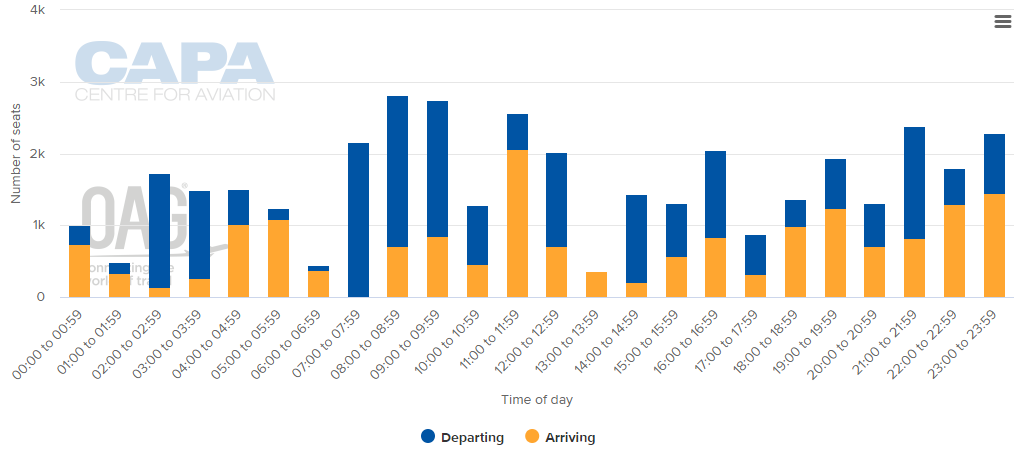 Source: CAPA - Centre for Aviation and OAG (data: w/c 29-Jun-2020)
Source: CAPA - Centre for Aviation and OAG (data: w/c 29-Jun-2020)
"We can't rely on these secondary methods forever. We have got to find a primary measure for controlling it," Mr Griffiths remarked, highlighting the Covid-19 testing that is provided at Dubai International for arriving and departing passengers as one specific area that will come under more pressure as traffic levels rise.
"We have enough real estate to accommodate passengers with current requirements, but a lot of the processes we are being asked to operate - like Covid-19 testing on arrival and departure - will struggle to operate at scale," he explained. That scale could come quite quickly given Emirates Airline's operation of 600+ seat A380s even with reduced occupancy levels.
Every crisis does contain the seeds of opportunity and airports will have to move quickly to adapt to the 'new normal' environment. A reduction in air services means a reduction in passengers with a pretty much linear impact on airport revenues - from charges through to car parking and retail.
"I think the customer proposition will change over time," said Mr Griffiths with technology "bringing the consumer and the product much more closely together" and businesses "creating much better value propositions".
Mr Griffiths has spoken previously of a 'hockey stick' shaped recovery and remains very cautious over how long it will take for travel demand to return. "In the case of Dubai I think we may bounce back pretty quickly as we have already dealt with the virus in a very definitive way. But the problem is other countries are recovering at different rates," he said.
In terms of the core point-to-point markets from Dubai he thinks that within two to three months they could recover 20% to 30% of traffic. The hibernation of some of Dubai International's terminal infrastructure will continue until the end of the year but this schedule has been built on "a plan for the worst and hope for the best principle," according to Mr Griffiths.
"It is a long and involved process with so many moving parts which no human on the planet has under their control, he noted. But despite an optimistic perspective that Dubai will be on the "front curve of the recovery as and when it comes", he warned: "I fear the economic tail of this particular situation will be very long and very painful for quite a lot of people."
LEARN MORE… You can watch the full CAPA Masterclass session on-demand by clicking here or on the image below. Life after Covid-19 is still a vast unknown however having highlighted the perspectives of airline CEOs, industry experts, tourism officials and aviation analysts over the last two months, this latest edition explored the airport perspective.
